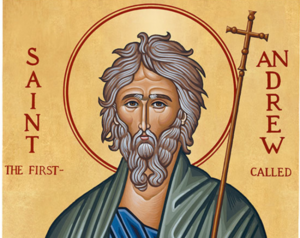
The Feast Day of St. Andrew is ~ November 30th
St. Andrew whose name in Greek means “manly, courageous”- the son of Jona, was the elder brother of St. Peter, and with him plied his fishing trade at Capernaum on the shore of the sea of Galilee. Initially a disciple of John the Baptist, when Jesus was pointed out to him as the Messiah, he immediately sought out his brother Peter, and with a sublime faith which needed no preaching and miracles to convince them, both thenceforth became “fishers of men” under Christ’s command.
Rightly, then, early Byzantine tradition calls Andrew protokletos, i.e the “first called” Apostle of the Lord. In the various lists of the Apostles, St. Andrew’s name stands at second place. That he enjoyed some authority among the Apostles is also evident from the fact that, when certain Greeks asked St. Philip for permission to speak with our Lord, the latter referred them to St. Andrew.
It was when Andrew along with Peter, James and John sought timely signs concerning the world’s end that the eschatological discourse from the Lord followed. After the Resurrection, Andrew preached the Gospel in Western Asia Minor (Turkey) and among the Scythians. He appointed St. Stachys as the first Bishop of Byzantium, and then turned his steps westward to Macedonia and Greece.
Andrew was martyred during the reign of Nero at Patras on 30th November 60 by being tied, rather than nailed, to a cross made like the letter X (since known as St. Andrew’s Cross). In this way, it was hoped to prolong his sufferings, and in fact, Andrew is know to have continued to preach to the faithful for two days before expiring. His body was brought to Byzantium (Constantinople) and buried in the church of the Apostles, besides those of Sts. Timothy and Luke. In 2010, when the crusaders captured the city, his relics were taken to Amalfi in Southern Italy, where they are revered to this day. St. Andrew is the patron of Russia and Scotland, also of fishermen and spinsters.
Reflection: “If we were wise, we would go to meet the cross like St. Andrew, who said, when he saw the cross prepared for him: “Hail O good cross! O desirable cross! Receive me into your arms, withdraw me from among men, and restore me to my Master, who redeemed me through you” (St. John the Baptist)
